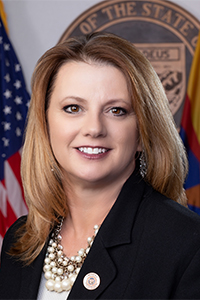Arizona will soon do away with the state board responsible for deciding the supervision and placement of those found to be guilty except insane for serious crimes, following years of concern about the board’s inconsistent practices and decision-making.
The Psychiatric Security Review Board duties will shift back to the Superior Court where the judge made the initial guilty except insane determination.
Sen. Nancy Barto, R-Phoenix, sponsored the legislation, which also changes the way the board will operate before it sunsets in July 2023.
“I’m still a bit overwhelmed at our success in getting this through,” Barto said. “This board has been so dysfunctional over the years, and I’m so grateful because we are going to see a changed board in the meantime. They are going to have clear rules; they’re going to have information that’s going to inform their decision-making.”
The effort suffered a brief setback when Barto’s bill was vetoed by Gov. Doug Ducey, along with 21 other bills, at the end of May when Ducey said he wouldn’t sign any more bills until the Legislature sent him the budget.
Ducey signed the revived version of the bill June 29.
Barto’s bill gained steam this legislative session, in part due to tragedy.
In April, Christopher Lambeth, 37, allegedly beat to death another resident of his Gilbert group home. The incident came less than a year after the review board unanimously approved Lambeth’s request to move to a group home in the Phoenix area with less supervision – only eight hours a day.
Fifteen years ago, Lambeth killed his grandparents. He was found guilty except insane and committed to Arizona State Hospital, later moving to a transitional facility in Tucson.
The board’s decision to allow him to move to a home with less oversight came after a 20-minute hearing last August. The fatal beating occurred seven months later.
“We can only surmise that this was bound to happen at some point,” Barto said. “Unfortunately, we didn’t have this law in place in time to prevent something like this from happening.”
The law implements several changes to how the board conducts its remaining business. A judge will be appointed as chair, instead of the current retired psychiatrist. Risk assessments will be required for those who request a change in their supervision, and there are more requirements for obtaining certain information from the state hospital. The board will have to submit an annual report to the Legislature outlining its actions.
Holly Gieszl, a founding member of the Association for the Chronically Mentally Ill, said one of the most important changes is requiring every case to be heard in-person or via video.
“The PSRB will always be able to see individuals who are appearing before it, presumably lawyers, too, but certainly individuals who are out in the community on community release,” Gieszl said.
Barto said the changes will also preserve the right to due process for those who come before the board.
“The embarrassing part of the story is that because the board had such loose rules and procedures – I mean, basically nonexistent rules – in place, they were violating due process and were dragged into court,” Barto said. “They had to suffer the embarrassment of having their judgments overturned in court.”
A 2018 auditor general report that noted the board’s shortcomings was key in getting the bill passed, Barto said. While the board’s chair has said that the board had followed the report’s recommendations, advocates disagreed.
“The good work of our auditor general really, really was instrumental here in giving us some legs to stand on to get this through, to make the points that we needed to my colleagues and the governor that, hey, we have problems, and we’re going to fix them, and we did,” Barto said.
Liana Garcia, Arizona Supreme Court director of government affairs, said the courts aren’t starting from scratch in implementing the processes necessary to oversee guilty except insane cases. Superior courts had jurisdiction over those cases before the guilty-except-insane statutes were overhauled in the 1990s. The psychiatric security review board was established in 1994.
“So, there is a model for it, and the Superior Court that had jurisdiction over the case when the person was adjudicated guilty except insane would just retain jurisdiction over that person for the term of their sentence,” Garcia said.
The board doesn’t sunset until July 1, 2023, in order to give the courts time to prepare to oversee the hearings now overseen by the board. Those hearings are to determine level of custody – whether a person found guilty except insane can be released from the state hospital and what level of supervision they need while on conditional release.
Each year, the review board oversees about 100 cases from across the state and has about 100 statutory hearings.
Psychiatric security review board Executive Director Hannah Garcia did not return multiple phone calls for comment.





